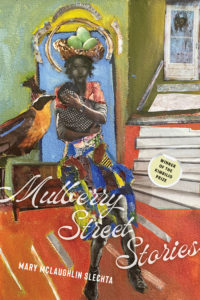 Review by Melanie McGehee
Review by Melanie McGehee
Mulberry Street Stories by Mary Slechta won the 2021 Kimbilio National Fiction Prize, an award that celebrates the best in contemporary fiction by writers of the African Diaspora. These twenty-five interwoven stories told in 190 short pages will surprise, delight, and sometimes confuse. Slechta proves herself a masterful storyteller as she conjures a neighborhood of characters that move in and out from each story selection, idling between past and present and, perhaps, future timelines.
Mulberry Street is fantastical – in parts. We begin with a fairy or folk tale of sorts. A young girl Dessa uses her final of three wishes, the first two wasted, from a talking carp. She wishes for a house on Mulberry Street. And then, our narrator promises this:
As for a house on Mulberry Street, it’s a fine wish. The houses are sturdy as castles and the neighbors, who walk about as kings and queens, will deign to push you out of the snowbanks and bring you pie and if you’ve been housebound bellow a “Happy New Year” well into spring and in June honk at you and your friends in your caps and gowns. Good people. The best. Oh, to be loved like that. Dessa, her mother, and grandmother lived there happily for many years.
The stories that follow are full of conflict – conflict between the real and the imagined, between family members and neighbors, between individuals and the society at-large. Slechta’s narrative voice, with enough authority to hold this all together, allows us to eavesdrop. We are a virtual peeping tom on this Mulberry Street, with its sometimes mundane and sometimes magical characters. But we do not come too close. We do not belong. We do not understand it all – and we want to, or at least I wanted to.
I was both fascinated and intrigued. One could read Mulberry Street Stories as a fun, far-fetched account with a hint of magical realism, but there is so much more. Amidst the vivid details and the lively dialogue, there is history. I suspect an entire university course could be spent on the history found in Slechta’s narratives: slavery, the Underground Railroad, the Great Migration, gentrification, Jim Crow. All this and more is weaved into the tale that Slechta spins.
Furthermore, as the narrator first promised, there is also love, and a lot of hope. I first saw hope when one Mulberry Street mother began giving to a beggar:
The old man craned his neck to see into the back seat, where the girls were pressed to the glass. He gave such a big, toothy smile she was shamed into opening the window and gingerly extending a dollar. Instead of taking it in one quick motion, he slid it from between her fingers, grazing the side of her hand as he did. In the surprise of being touched, she had a closer look at his sign. It didn’t spell help. It spelled hope.
Afterwards, I saw it appear again and again in the text: hope. Mulberry Street Stories is a book that needs visiting again and again. Perhaps on my next read I will catch more of the hope and the love. Perhaps that is Slechta’s dream, a perfect neighborhood. I think the understanding she brings to me, someone not part of Mulberry Street, brings us closer.
Mulberry Street Stories, by Mary McLaughlin Slechta
Four Way Books, September 2023, $19.95 [paper]
ISBN 9781954245747
Melanie McGehee writes about family and faith. Her most recent poetry appeared in The Dead Mule School of Southern Literature. She is finishing an MFA at Wilke’s University and revising a memoir-in-essays.
